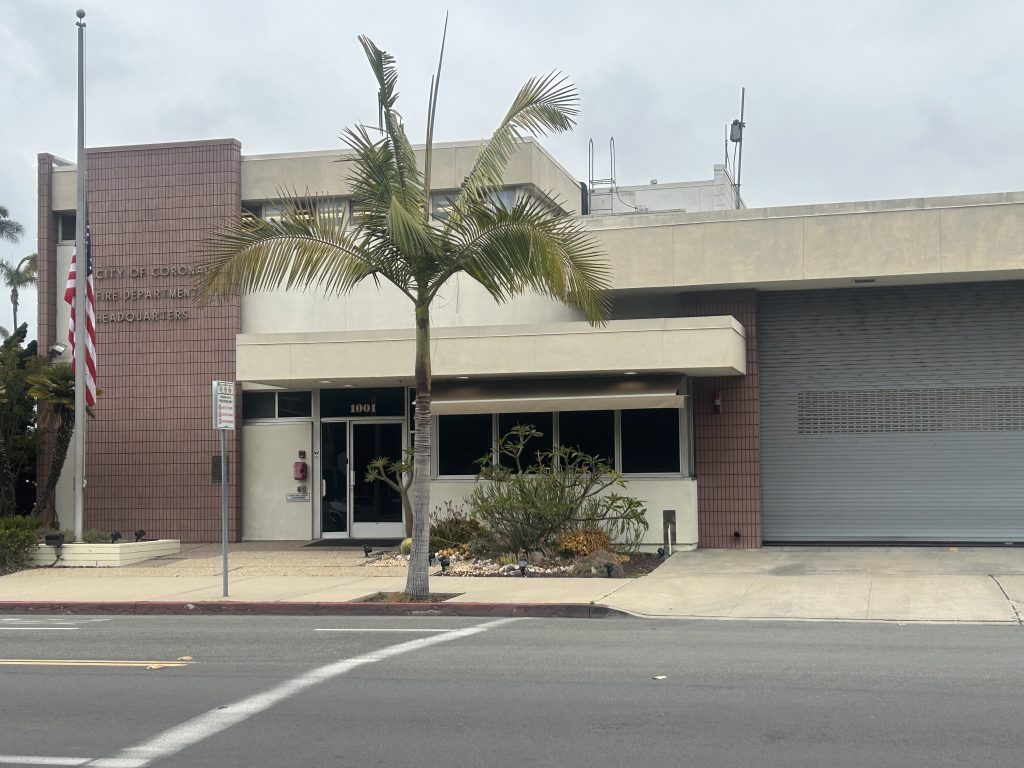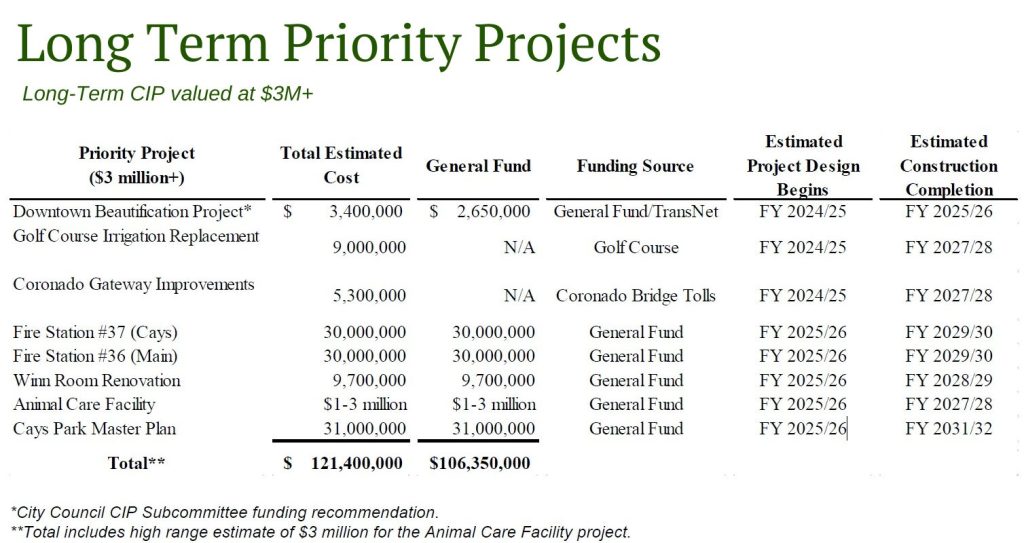With many large projects looming, the City of Coronado is prioritizing its to-do list.
Doing so will help leaders take a more cohesive approach to its planning and ensure that funding is appropriated efficiently in wake of a $15 million budgetary surplus, healthy general fund reserves, and certain, project-restricted funds whose money will soon expire.

Top-priority projects include replacing the city’s over 50-year-old fire stations, improving Cays Park, a renovation and possible expansion of the library’s Winn Room, a downtown beautification project, replacing the irrigation system at the city’s golf course, revitalization of the city’s animal care facility (which is currently operated by PAWS), and Coronado gateway improvements.
The Coronado City Council at a May 7 meeting discussed its priorities ahead of a more in-depth discussion of next year’s budget, which is slated for a May 21 meeting. (Each project, and its cost, is detailed below.)
“These are important projects, and they also come with very high price tags,” said Coronado City Manager Tina Friend. “Reasonably, the City Council is asking how we are going to achieve these projects within a reasonable timeframe.”
Council members agreed that the mentioned projects should all be priorities, with slight variations in opinions of sequencing. All agreed that the city should reduce ambiguity that allows projects to be pushed months, years, or even decades down the road.
“I think we need to start putting expiration dates on the things we talk about,” said Council Member Casey Tanaka. “We talk about all of these studies we want to do (for projects), and then we don’t do it. We come a little closer to doing it, we come a little closer to identifying what doing it will look like, but we don’t actually put a deadline on ourselves to do things.”
He suggested that the council put deadlines on itself for accomplishing things – particularly the two fire stations.
Friend agreed. When she once mentioned that new fire stations were eight years out, she said, fire fighters laughed: They’d been hearing that for decades, they said.
She said one request for next year’s budget will include funding for a community risk assessment study, which would evaluate current and future fire safety needs, a process that could take around nine months.
Tanaka pushed back, saying that the city can still have a deliberate conversation later this month and attempt to establish a timeline for study, design, and a goal for construction to start, even if the specifics are not yet known. The rest of the council supported this idea, and Friend said including this in the May 21 budget discussion was doable.
City Council Member Mike Donovan said that, since all projects were priorities, it would be prudent for Coronado to first prioritize ones that would immediately save the city money, like the golf course irrigation replacement project and the animal care facility.
Donovan also noted that, even though some projects already have funding available, the city has finite staff power with which to execute. The gateway project, for example, will be funded by residual funding from the now defunct toll on the San Diego Coronado Bay Bridge. That money can only be used for specific projects, and the gateway project, which will beautify the area near the bridge’s toll gate qualifies, so it is not a question of how to fund – it just needs to be done.
“It’s not just the money,” Donovan said, “but it’s also the staff that we need to execute this, so that’s the other piece of this: We can only do so much at one time.”
Council Member Carrie Downey suggested that the city look into hiring another project manager rather than continue to wait for projects. The entire council agreed that the city needs to stop deliberating and start executing.
“One of the things I notice when we keep dragging things out,” Downey said, “is by the time we get around to them, the estimates are all old. I think we need to get done the ones that are all almost done but have been hanging around forever and ever and take them off the list.”
To Downey, that would be the downtown beautification projects, the Cays Park, and the Winn Room.
Council member John Duncan agreed with Tanaka that the fire stations should be prioritized, and beyond that, prioritized Cays Park, the Winn Room, and the animal care facility “primarily based on how far down the road we are.”
Mayor Richard Bailey, who participated remotely with Tanaka acting as mayor pro tem, supported the council’s direction on its priorities.
However, he also cautioned that, even though Coronado’s budget is healthy now, staff projected that Coronado’s general fund excess would drop by 50% in about five years. That drop still represents an excess funding of 196% – something Friend said would be “the envy of most cities” – but Bailey said the city should plan for future costs.
“If we’re not careful, we could get into a position where our expenses outpace our general fund excess as more and more capital improvement projects come up,” Bailey said.
Paying for big-ticket projects
The council heard a presentation on the city’s existing revenue streams, as well as additional options for funding, at its May 7 meeting.
One existing stream is Fund 436, otherwise known as the facilities maintenance fund, which was established in 2015 to create a reserve for necessary repairs across city properties’ life cycles.
Coronado makes annual, index-based contributions to the fund, but paused them in 2023 and 2024 due to a reduction in transient occupancy taxes (TOT) as the Hotel del Coronado undergoes a major renovation. The rest of the council supported this funding.
The city will request the $10 million in catch-up funding, as well as a study to reconsider the fund’s formula to account for inflation and rising construction costs, for next year’s budget. Bailey said he would support this, and the rest of the council agreed.
The city also imposes use fees for certain of its enterprise funds, such as for operating its golf course.
Coronado is currently implementing a fee study that will assess whether recreation, ambulance, and development fees should increase. Those results are expected later this year.
The city also plans to reassess its stormwater fees. Coronado transferred $820,000 from its general fund to its stormwater fund last year, with a projected $500,000 transfer coming this year.
“The stormwater fund has been a perennial problem since I’ve been on the council,” Donovan said. “These fees need to have a lot of back-up data, because residents shouldn’t have to pay more for a service than it costs. But in a perfect world, we wouldn’t have to take money out of the general fund because it would be self-sustaining.”
Projections decrease these revenue transfers annually until they hit zero for the fiscal year 2027-28, but Donovan said this is so any increase in stormwater fees is gradual and not a shock to residents.
“But that means we’re going to subsidize it less from the general fund and the property owners are going to pay higher rates to make up whatever it needs to match that,” Downey said.
Finally, the city has $26 million in its Community Development Agency fund. By law, the fund must be depleted by the time the tax allocation refunding bonds, which the city refinanced from loans in 2018, are paid off. The estimated pay-off is in early fiscal year 2028.
There is currently about $16 million in the fund, and the rest is in a relinquishment fund that would have been paid had Coronado gone through with taking over operation of State Route 75 from the California Department of Transportation, which was approved in 2020 but later canceled.
Potential additional funding sources include grants and other federal and state funding, general obligation changes, or levying additional taxes. The city will request funding for an additional grant consultant to assist with identifying and writing grants in next year’s budget.
Although the council did not make any decisions ahead of its budget meeting next week, Friend said the conversation would help city staff draft a plan for knocking out its most important projects. A more in-depth discussion is expected at the May 21 meeting.
“My biggest desire here,” said Duncan in a sentiment the rest of the council echoed throughout the meeting, “is when we have the information to make decisions, we make them, and don’t just kick them, because it’s tough to do the same hearings over and over.”





